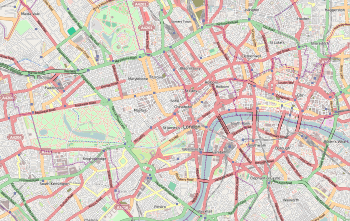Unicorn Theatre
 Unicorn Theatre | |
 Unicorn Theatre Location within Central London | |
| Address |
Tooley Street London, SE1 United Kingdom |
|---|---|
| Coordinates | 51°30′16″N 0°04′54″W / 51.504496°N 0.081677°W |
| Public transit |
|
| Owner | Unicorn Trust |
| Type | Receiving and producing house |
| Capacity |
290–seat (main) 100–seat (studio theatre) |
| Production | Guest productions |
| Construction | |
| Opened | 2005 |
| Architect | Keith Williams |
| Website | |
| unicorntheatre.com | |
The Unicorn Theatre is the UK's leading theatre for audiences aged 2–21. The theatre has its home in a custom-built, RIBA Award–winning building on Tooley Street, in the London Borough of Southwark, which opened in 2005.[1] The theatre was designed by Keith Williams, built by Arup and comprises two theatre spaces (the Weston and Clore Theatres), an education studio, rehearsal space, café and the John Lyon meeting room.
The theatre was founded in 1947, by Caryl Jenner, originally as a Mobile Theatre; In 1961, Jenner began presenting children's productions at the Arts Theatre in the West End, and in 1967 the company took over the lease of the theatre which then became Unicorn's permanent performing base until 1999; during this period the normal run of adult performances continued during the evenings.[2]
The Unicorn is a registered charity and is an Arts Council England National Portfolio organisation.
Origins
From 1944 Caryl Jenner wrote Christmas pantomimes for small-time playhouses. During performances she would make note of the behaviour of the children, recording what scenes and sequences held their attention, and which did not. She began to formulate the principles that would guide her theatre and writing. In 1947 the ‘Mobile Theatre’ was born. Caryl's mission was to drive around the austere post-war towns of Britain, as well as isolated villages to bring theatre to new audiences. They supplemented their income by performing to adults in the evenings but their goal was always to captivate the minds and imagination of children.
The ‘Mobile Theatre’ continued to grow in reputation, gaining success and acclaim. In 1950 it changed its name to ‘The Caryl Jenner Mobile Theatre’, to signify Caryl’s influence. In 1962, the name changed again, to the ‘Unicorn Theatre Club’. In 1967, the company gave up touring and took up the lease at the Arts Theatre in London, receiving a £10,000 annual grant from the Arts Council, which remained its home until the present Unicorn Theatre was built in 2005. Caryl Jenner died on the 29th of January 1973 at the age of 55. She left behind a theatre with national acclaim and a clear set of artistic principles.
Presidents
The current president is Juliet Stevenson, who took over from Sir Alan Ayckbourn CBE in 2007.
Artistic Directors
- Caryl Jenner (1947–1973)
- Matyelok Gibbs (1973–1977)
- Nicholas Barter (1977–1986)
- Chris Wallis (1986–1990)
- Richard Williams (1990–1997)
- Tony Graham (1997–2011)
- Purni Morell (2011-Current)
Gallery
 The Weston Theatre, the Unicorn's main stage, seating approximately 290.
The Weston Theatre, the Unicorn's main stage, seating approximately 290. Exterior of the Unicorn Theatre designed by Keith Williams.
Exterior of the Unicorn Theatre designed by Keith Williams. New adaptation of Eoin Colfer’s ‘The Legend of Captain Crow’s Teeth’, being performed at the Unicorn Theatre this Spring 2012.
New adaptation of Eoin Colfer’s ‘The Legend of Captain Crow’s Teeth’, being performed at the Unicorn Theatre this Spring 2012.
Awards
TMA Equity Theatre Award for Best Show for Children and Young People TOM’S MIDNIGHT GARDEN (2001)
- RED RED SHOES (Nomination 2002)
- LOOKING FOR JJ (2008) co-production with Pilot Theatre
- FOR THE BEST (2009) co-production with Mark Storor and Anna Ledgard
Arts Council Award for Best New Play for Children
- RED RED SHOES (2004)
Writers’ Guild Award for Best New Play for Children and Young People
- SLEEPING BEAUTY (Nomination 2009)
- RED FORTRESS (Nomination 2009)
Theatre Centre Brian Way Award for Best New Play for Young People
- BILLY THE KID (Nomination 2008)
- DUCK! (Nomination 2009)
Eleanor Farjeon Award (For an outstanding contribution to the world of children’s books)
- Nomination 2006
- Nomination 2009
Linbury Prize for Stage Design
- Host company for 3 short-listed designers (2009) in recognition of Unicorn’s commitment to high production values and quality.
Time Out Top 5 Best Shows for Family Audiences
- BILLY THE KID (No. 1 in 2007)
- RED FORTRESS (No. 4 in 2008)
- PERO (No. 1 in 2008) international co-production with Speeltheater Holland
References
- ↑ "Unicorn Theatre London : Architecture Information". e-architect, UK. Retrieved February 5, 2012. External link in
|publisher=(help) - ↑ "Arts Theatre and Unicorn Theatre Archive, 1902-1982". Theatre Collections. Victoria and Albert Museum, London, UK. Retrieved February 5, 2012.
Sources
- The Oxford Companion to the Theatre, Phyllis Hartnoll (ed), Oxford, 1983. ISBN 0-19-211546-4.
External links
- Official website
- http://unicorntheatre.com/whats-on
- The Arts Theatre and Unicorn Theatre Archive is held by the Victoria and Albert Museum Theatre and Performance Department.